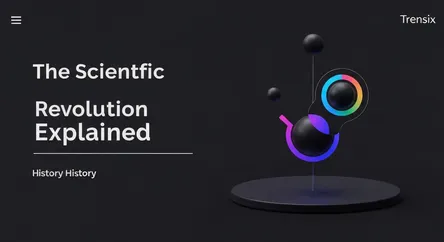History
The Scientific Revolution Explained

Discover the Scientific Revolution, the period that replaced ancient beliefs with modern science, forever changing our view of the universe.
What is it?
The Scientific Revolution was a series of events in Europe during the 16th and 17th centuries that marked the emergence of modern science. This period saw a dramatic shift from the long-held Greek view of nature to a new understanding based on empirical evidence, experimentation, and mathematics. Thinkers like Nicolaus Copernicus proposed a heliocentric (sun-centered) model of the universe, challenging the traditional Earth-centered view. This was followed by Johannes Kepler's laws of planetary motion and Galileo Galilei's telescopic observations. The era culminated with Isaac Newton, whose laws of motion and universal gravitation provided a comprehensive framework for the physical world.
Why is it trending?
The Scientific Revolution remains a crucial topic because it established the foundations of modern scientific inquiry. A key development was the scientific method, championed by figures like Francis Bacon, which proposed that knowledge should be gained through observation and experimentation rather than reliance on tradition. This new way of thinking not only revolutionized science but also fueled the intellectual movement known as the Enlightenment, which valued reason and individualism. Its principles are the bedrock of today's technological and scientific progress, making it perpetually relevant.
How does it affect people?
The Scientific Revolution fundamentally transformed society's view of nature and humanity's place in the cosmos. By emphasizing reason and observable evidence, it challenged the authority of traditional institutions and religious doctrines. This paved the way for modern secular thought and governance. The advancements in fields like anatomy, physics, and astronomy laid the groundwork for countless technologies and medical innovations that define modern life. The revolution's legacy is the very concept of seeking knowledge through testing and proof, which continues to drive innovation and shape our world.